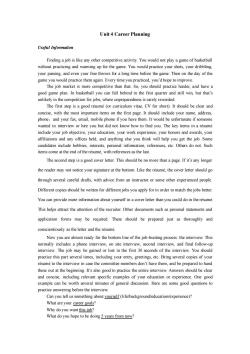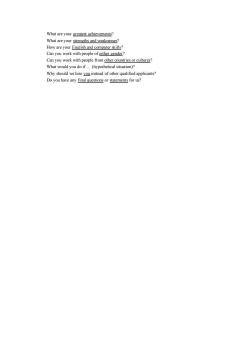《新编大学英语》综合教程(第三版第三册)B3U4_Self-market_Reading Material_B3U4 课文背景材料

Unit 4 Career Planning Useful Information Finding a job is like any other competitive activity.You would not play a game of basketball without practicing and warming up for the game.You would practice your shots,your dribbling, your passing,and even your free throws for a long time before the game.Then on the day of the game you would practice them again.Every time you practiced,you'd hope to improve. The job market is more competitive than that.So,you should practice harder,and have a good game plan.In basketball you can fall behind in the first quarter and still win,but that's unlikely in the competition for jobs,where unpreparedness is rarely rewarded. The first step is a good resume (or curriculum vitae,CV for short).It should be clear and concise,with the most important items on the first page.It should include your name,address, phone,and your fax,email,mobile phone if you have them.It would be unfortunate if someone wanted to interview or hire you but did not know how to find you.The key items in a resume include your job objective,your education,your work experience,your honors and awards,your affiliations and any offices held,and anything else you think will help you get the job.Some candidates include hobbies,interests,personal information,references,etc.Others do not.Such items come at the end of the resume,with references as the last. The second step is a good cover letter.This should be no more than a page.If it's any longer the reader may not notice your signature at the bottom.Like the resume,the cover letter should go through several careful drafts,with advice from an instructor or some other experienced people. Different copies should be written for different jobs you apply for in order to match the jobs better. You can provide more information about yourself in a cover letter than you could do in the resume. This helps attract the attention of the recruiter.Other documents such as personal statements and application forms may be required.These should be prepared just as thoroughly and conscientiously as the letter and the resume. Now you are almost ready for the bottom line of the job-hunting process:the interview.This normally includes a phone interview,on site interview,second interview,and final follow-up interview.The job may be gained or lost in the first 30 seconds of the interview.You should practice this part several times,including your entry,greetings,etc.Bring several copies of your resume to the interview in case the committee members don't have them,and be prepared to hand these out at the beginning.It's also good to practice the entire interview.Answers should be clear and concise,including relevant specific examples of your education or experience.One good example can be worth several minutes of general discussion.Here are some good questions to practice answering before the interview. Can you tell us something about yourself(life/background/education/experience)? What are your career goals? Why do you want this job? What do you hope to be doing 5 years from now?
Unit 4 Career Planning Useful Information Finding a job is like any other competitive activity. You would not play a game of basketball without practicing and warming up for the game. You would practice your shots, your dribbling, your passing, and even your free throws for a long time before the game. Then on the day of the game you would practice them again. Every time you practiced, you’d hope to improve. The job market is more competitive than that. So, you should practice harder, and have a good game plan. In basketball you can fall behind in the first quarter and still win, but that’s unlikely in the competition for jobs, where unpreparedness is rarely rewarded. The first step is a good résumé (or curriculum vitae, CV for short). It should be clear and concise, with the most important items on the first page. It should include your name, address, phone,and your fax, email, mobile phone if you have them. It would be unfortunate if someone wanted to interview or hire you but did not know how to find you. The key items in a résumé include your job objective, your education, your work experience, your honors and awards, your affiliations and any offices held, and anything else you think will help you get the job. Some candidates include hobbies, interests, personal information, references, etc. Others do not. Such items come at the end of the résumé, with references as the last. The second step is a good cover letter. This should be no more than a page. If it’s any longer the reader may not notice your signature at the bottom. Like the résumé, the cover letter should go through several careful drafts, with advice from an instructor or some other experienced people. Different copies should be written for different jobs you apply for in order to match the jobs better. You can provide more information about yourself in a cover letter than you could do in the résumé. This helps attract the attention of the recruiter. Other documents such as personal statements and application forms may be required. These should be prepared just as thoroughly and conscientiously as the letter and the résumé. Now you are almost ready for the bottom line of the job-hunting process: the interview. This normally includes a phone interview, on site interview, second interview, and final follow-up interview. The job may be gained or lost in the first 30 seconds of the interview. You should practice this part several times, including your entry, greetings, etc. Bring several copies of your résumé to the interview in case the committee members don’t have them, and be prepared to hand these out at the beginning. It’s also good to practice the entire interview. Answers should be clear and concise, including relevant specific examples of your education or experience. One good example can be worth several minutes of general discussion. Here are some good questions to practice answering before the interview. Can you tell us something about yourself (life/background/education/experience)? What are your career goals? Why do you want this job? What do you hope to be doing 5 years from now?

What are your greatest achievements? What are your strengths and weaknesses? How are your English and computer skills? Can you work with people of either gender? Can you work with people from other countries or cultures? What would you do if...(hypothetical situation)? Why should we hire you instead of other qualified applicants? Do you have any final questions or statements for us?
What are your greatest achievements? What are your strengths and weaknesses? How are your English and computer skills? Can you work with people of either gender? Can you work with people from other countries or cultures? What would you do if … (hypothetical situation)? Why should we hire you instead of other qualified applicants? Do you have any final questions or statements for us?
按次数下载不扣除下载券;
注册用户24小时内重复下载只扣除一次;
顺序:VIP每日次数-->可用次数-->下载券;
- 《新编大学英语》综合教程(第三版第三册)B3U3_Self-market_Reading Material_B3U3课文翻译及课后练习答案.doc
- 《新编大学英语》综合教程(第三版第三册)B3U3_Self-market_Reading Material_B3U3 课文背景材料.docx
- 《新编大学英语》综合教程(第三版第三册)B3U1_Self-market_Reading Material_B3U1课文翻译及课后练习答案.doc
- 《新编大学英语》综合教程(第三版第三册)B3U1_Self-market_Reading Material_B3U1 课文背景材料.docx
- 《新编大学英语》综合教程(第三版第三册)B3U4_Self-market_B3U4 QUIZ_Unit 4 Quiz.doc
- 《新编大学英语》综合教程(第三版第三册)B3U4_Self-market_B3U4 QUIZ_B3U4 Oral Quiz.ppt
- 《新编大学英语》综合教程(第三版第三册)B3U4_Self-market_B3U4 Grammar and Vocabulary.doc
- 《新编大学英语》综合教程(第三版第三册)B3U3_Self-market_B3U3 Grammar and Vocabulary.doc
- 《新编大学英语》综合教程(第三版第三册)B3U1_Self-market_B3U1 Grammar and Vocabulary.doc
- 《新编大学英语》综合教程(第三版第三册)B3U4_Self-market_B3U03 QUIZ_B3U3 Oral Quiz.ppt
- 《新编大学英语》综合教程(第三版第三册)B3U1_Self-market_B3 U1 QUIZ_B3U1 quiz.doc
- 《新编大学英语》综合教程(第三版第三册)B3U1_Self-market_B3 U1 QUIZ_B3U1 Oral Quiz.ppt
- 《新编大学英语》综合教程(第三版第三册)B3U7_B3 U7 Self-market_Writing Material_写作中易犯的语法错误.docx
- 《新编大学英语》综合教程(第三版第三册)B3U7_B3 U7 Self-market_Reading Material_My Own Journey.docx
- 《新编大学英语》综合教程(第三版第三册)B3U7_B3 U7 Self-market_Reading Material_Camp in a California wilderness.docx
- 《新编大学英语》综合教程(第三版第三册)B3U7_B3 U7 Self-market_Listening Material_script.docx
- 《新编大学英语》综合教程(第三版第三册)B3U7_B3 U7 Self-market_B3 U7 QUIZ_06 B3U07 quiz.doc
- 《新编大学英语》综合教程(第三版第三册)B3U7_04 B3 U7 Translation & Writing.ppt
- 《新编大学英语》综合教程(第三版第三册)B3U7_03 B3 U7 Read by critical thinking.ppt
- 《新编大学英语》综合教程(第三版第三册)B3U7_02 B3 U7 Activate.ppt
- 《新编大学英语》综合教程(第三版第三册)B3U4_Self-market_Reading Material_B3U4课文翻译及课后练习答案.doc
- 《新编大学英语》综合教程(第三版第四册)B4U1 Activate.ppt
- 《新编大学英语》综合教程(第三版第四册)B4U1 Menu.ppt
- 《新编大学英语》综合教程(第三版第四册)B4U1 QUIZ_06 B4U01 QUIZ.doc
- 《新编大学英语》综合教程(第三版第四册)B4U1 QUIZ_oral quiz.ppt
- 《新编大学英语》综合教程(第三版第四册)B4U1 Read by critical thinking.ppt
- 《新编大学英语》综合教程(第三版第四册)B4U1 Translation & Writing.ppt
- 《新编大学英语》综合教程(第三版第四册)B4U1_self-market_background information.doc
- 《新编大学英语》综合教程(第三版第四册)B4U1_self-market_For teachers.doc
- 《新编大学英语》综合教程(第三版第四册)B4U1_self-market_self-listening_phelps.doc
- 《新编大学英语》综合教程(第三版第四册)B4U1_self-market_self-reading_About leisure time.doc
- 《新编大学英语》综合教程(第三版第四册)B4U1_self-market_self-reading_How Christie Wrote.doc
- 《新编大学英语》综合教程(第三版第四册)B4U1_self-market_self-writing_如何表达总论点1.doc
- 《新编大学英语》综合教程(第三版第四册)B4U1_self-market_vocabular and grammar.doc
- 《新编大学英语》综合教程(第三版第四册)B4U2 Activate.ppt
- 《新编大学英语》综合教程(第三版第四册)B4U2 Menu.ppt
- 《新编大学英语》综合教程(第三版第四册)B4U2 QUIZ_06B4U02 QUIZ.doc
- 《新编大学英语》综合教程(第三版第四册)B4U2 QUIZ_oral quiz.ppt
- 《新编大学英语》综合教程(第三版第四册)B4U2 Read by critical thinking.ppt
- 《新编大学英语》综合教程(第三版第四册)B4U2 Translation & Writing.ppt
